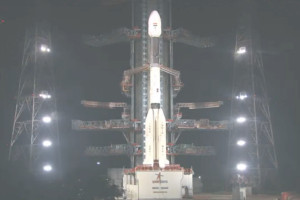
File photo of the failed EOS-3 launch
EOS-02 is a technology demonstration satellite for various new technologies with applications that include agriculture, forestry, geology, hydrology, miniaturised power electronics, reaction wheels
An anomaly in the Cryogenic Upper Stage led to the failure of the EOS-3 mission last year
New Delhi: The EOS-02 satellite will be launched in the second quarter of 2022. In a written reply to a question in the Rajya Sabha today, Union Minister of State for Space Dr Jitendra Singh said, EOS-02 is a technology demonstration satellite for various new technologies with applications that include agriculture, forestry, geology, hydrology, miniaturised power electronics, reaction wheels etc. and forming the payload for SSLV-1.
He informed that the slated date of launch was during Quarter-4 of 2021, but the onset of the pandemic and consequent lockdown and disruption in global as well as domestic supply chain were factors for the delay of spacecraft realisation due to non-availability of components, manpower and facilities.
Dwelling on the reasons for the failure of the launch of the EOS-3 satellite on August 12 last year, Dr Singh said, initial investigations with the post-flight data conducted immediately after the launch indicated an anomaly in the Cryogenic Upper Stage led to the failure of the mission.
Also read:
- Countdown for the launch of ISRO’s EOS-3 begins
- PSLV successfully launches EOS and nine customer satellites from Sriharikota
A National level Failure Analysis Committee (FAC) consisting of experts from academia and ISRO was immediately constituted to identify the causes of the anomaly in the Cryogenic Upper Stage of GSLV, that led to a mission abort and to recommend corrective actions for future missions. The Committee observed that the build-up of pressure in the propellant (Liquid Hydrogen or LH2) tank during the flight was not normal leading to a lower tank pressure at the time of ignition of the engine.
This resulted in anomalous operation of the Fuel Booster Turbo Pump (FBTP) mounted inside the LH2 tank which feeds the main turbopump of the engine resulting in an insufficient flow of Liquid Hydrogen into the engine thrust chamber. Detailed studies indicate that the most likely reason for the observed reduction in LH2 tank pressure is a leak in the respective Vent and Relief Valve (VRV), which is used for relieving the excess tank pressure during flight. Computer simulations as well as multiple confirmatory ground tests, closely simulating the conditions in the GSLV-F10 flight, validated the analysis by the FAC.
The Minister informed that the Failure Analysis Committee has recommended improvements to enhance the robustness of the Cryogenic Upper Stage for future GSLV missions. The GSLV vehicle with the required modifications in the Cryogenic Upper Stage is expected to be ready by the third quarter of 2022. The satellite identified for the next GSLV mission is expected to be ready for launch in the fourth quarter of 2022. Therefore, no delay is envisaged with respect to the related projects due to the failure.
The details of the satellites included in the EOS series are as follows
-
- EOS-01: Earth Observation satellite meant for Agriculture, Forestry & disaster management support
- EOS-02: Technology demonstration satellite for various new technologies with applications that include agriculture, forestry, geology, hydrology etc. and forming the payload for SSLV-1.
- EOS-03: First Agile Earth Observation satellite in Geostationary orbit and applications which include near real-time imaging, quick monitoring of natural disasters, spectral signatures for agriculture, forestry etc.
- EOS-04: Radar Imaging satellite meant to provide high-quality images under all weather conditions for applications such as Agriculture, Forestry & Plantations, Soil Moisture & Hydrology and Flood Mapping.
- EOS-05: Earth Observation Satellite in the Geostationary Orbit.
- EOS-06: Earth Observation satellite meant for applications, which include ocean-related services and advisories towards potential fishing zone forecast, ocean state forecast
– global bihari bureau





